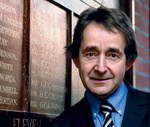Interview: Anthony Seldon
Anthony Seldon tells Roderick Easdale how he could have made Gordon Brown a better Prime Minister


If Gordon Brown had gone to Wellington, he'd be a far better Prime Minister.' I am in the Master's study at Wellington College, a quarter of a century after my previous visit there, a scholarship interview. The decor is different, but then, so is the college. I'm back at school, here to learn. But I learn less than I had hoped. The interview has been reduced to just over half an hour by his meetings overrunning, and 30 minutes doesn't bring many words from Anthony Seldon. His answers are preceded by long silences, and when he speaks, the words are sparse he talks in crafted soundbites, headlines not explanations.
He quizzes me about my time here. I tell him of how little I thought of the school, how I left knowing I would never hate anyone as much as I did my housemaster, whose attitude was more akin to a prison governor than a developer of talent. In response, Dr Seldon says he had disliked his time at his public school, Tonbridge, and that he didn't want to run a school like that. He explains how Wellington is pioneering the teaching of 'the eight intelligences logical, linguistic, sporting, artistic, personal, social, moral and spiritual. Gordon Brown only has the first two; we could have taught him the other six.' As well as being a head master he became the 13th Master of Wellington College two years ago, having been headmaster of Brighton College for eight years Dr Seldon is a biographer of Thatcher, Major and Blair. Did his opinion of Tony Blair improve during his researches? 'Yes. He's a man of prodigious talent and prodigious human quality.
But he failed to fulfil the historic opportunity available to him. He didn t know what he wanted to do.' What kind of Prime Minister would David Cameron be? Good he's thoughtful, he listens and he s decisive.' Decisive is what Dr Seldon has been in making Wellington, and Brighton before it, fully co-educational. Set up in honour of the victor of Waterloo, to educate the sons of dead officers, Wellington College opened in 1859 near the Royal Military Academy Sandhurst (and nearer Broadmoor), its motto Heroum Filii. Was Dr Seldon brought in to make this change, or was it his idea? 'It had already been mooted.
But I made it happen like that,' he says, snapping his fingers. 'If I hadn't wanted it, it wouldn't have happened. Some of the best schools are single sex, some of the worst co-educational. But I believe the sexes should be educated together, just as all colours and all races should be.' When I mention that rocketing fees have reduced the variety of backgrounds of the pupils from when I was there, he retorts: 'More children go to independent schools than ever before. The well off in society now have more money. We have a wide cross-section of parents here doctors, accountants, diplomats, financiers, solicitors, service people, politicians, writers, some farmers.' To some, Dr Seldon is the greatest public school reforming headmaster of his generation; to others, a crank. Both groups are apt to cite his 'happiness lessons', run in conjunction with the Well-being Institute of Cambridge University. 'They are designed to maximise happiness and encourage mental and physical health and intelligence in the roundest possible sense.
Education should be about the values of love, aspiration, compassion and development of the whole individual. Schools are ridiculously over-concentrating on the narrow academic skills.' Not that Wellington neglects this side under Dr Seldon, it's rising up from the darkest depths of the academic league tables. How long does he expect to stay at Wellington? 'For most heads, about seven years is right. If an ambassador does four years and a government minister two, then seven years is a long time.' How would he like to leave the college? 'As the most inspiring, innovative co-educational boarding school in Britain?' Will he succeed? 'Probably.'
For more on the countryside visit www.countrylife.co.uk/countryside
Sign up for the Country Life Newsletter
Exquisite houses, the beauty of Nature, and how to get the most from your life, straight to your inbox.
Country Life is unlike any other magazine: the only glossy weekly on the newsstand and the only magazine that has been guest-edited by HRH The King not once, but twice. It is a celebration of modern rural life and all its diverse joys and pleasures — that was first published in Queen Victoria's Diamond Jubilee year. Our eclectic mixture of witty and informative content — from the most up-to-date property news and commentary and a coveted glimpse inside some of the UK's best houses and gardens, to gardening, the arts and interior design, written by experts in their field — still cannot be found in print or online, anywhere else.
-
 London Craft Week: Rolls-Royce demonstrates the true beauty of real artisanship
London Craft Week: Rolls-Royce demonstrates the true beauty of real artisanshipA triptych of British nature scenes show that the difference between manufacturing and art is not as wide as we might think.
-
 Name that dog: Country Life Quiz of the Day, May 13, 2025
Name that dog: Country Life Quiz of the Day, May 13, 2025One of Britain's most picturesque streets and Tom Brown's school find their way in to Tuesday's quiz.